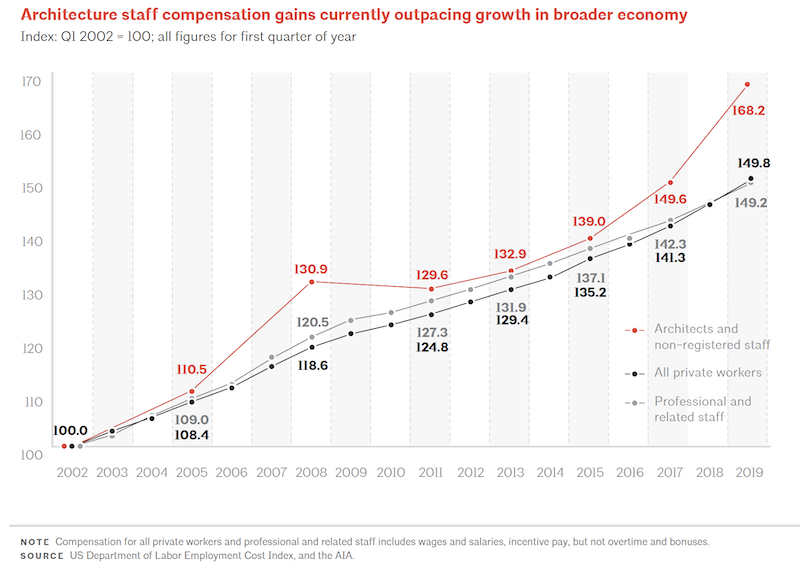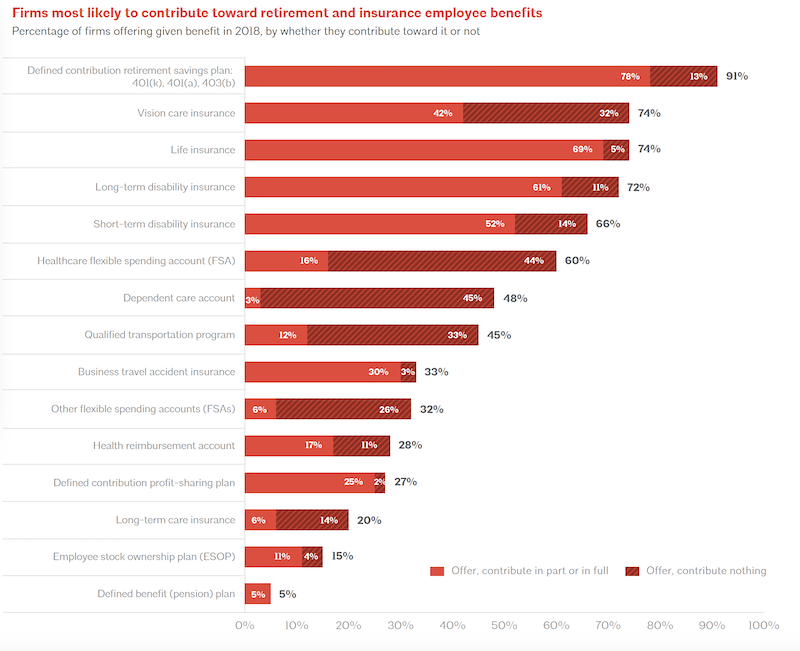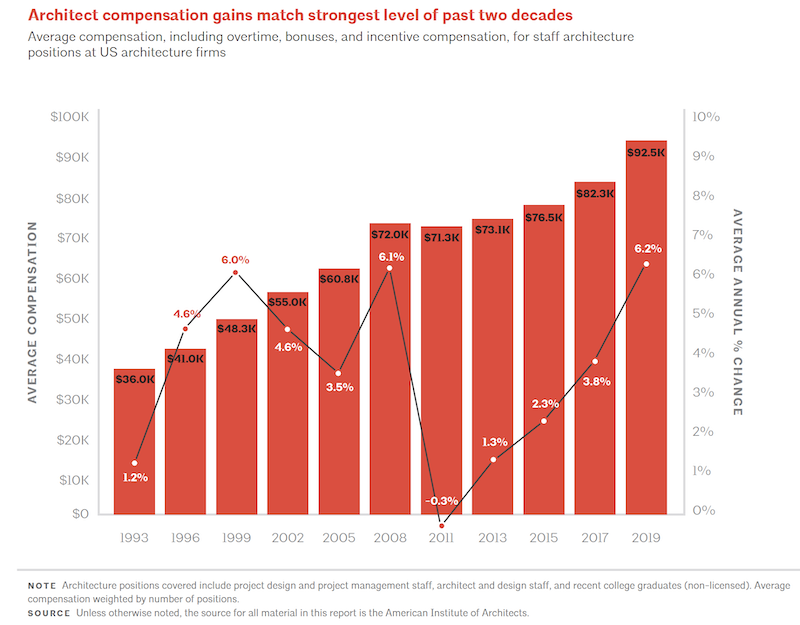The burst in construction spending over the past several years has been a boon to architectural firms, where as an industry payroll employment has grown by an average of 7,500 positions per year over the past six years. About 4,500 of that annual increase in staffing have been for architectural positions.
Demand for architects is reflected in the increased compensation that firms have been bestowing on hires and employees for recruitment and retention. In its latest Compensation Report, the American Institute of Architects (AIA) finds that average compensation across all architectural staff positions averaged in excess of $92,000 at the beginning of 2019, up more than 6% per year from early 2017 levels.
That increase, though, comes with a stinger: the last times architect salaries reached an increase of 6% per year—1999 and 2008—were either just prior to, or as the economy and the construction sector were entering, national economic downturns.
That being said, average architectural compensation has seen substantial growth beyond mere inflation over the past two decades. In 2019 dollars, average architecture compensation in 1990 was just over $70,000. The 12% increase over the past two years was twice the pace of growth in compensation for all workers in the U.S. economy, and 2.5 times the pace of all professional and related state, according to the Department of Labor’s Employment Cost Index.
 Compensation gains for architectural staff have exceeded those for other workers.
Compensation gains for architectural staff have exceeded those for other workers.
The AIA Compensation Report is based on a national survey conducted by AIA and Readex Research earlier this year. Responses from 640 firms with 959 locations are broken down by 28 states, 28 metro areas, and 16 cities. The survey provides in-depth compensation information on 44 positions.
The survey finds wide ranges of compensation by metro and position. For example, the average base pay plus compensation for recent non-licensed graduates was $55,790 nationally. San Jose paid the highest ($65,900) and Pittsburgh the lowest ($45,800). However, the grads hired in San Jose were paying 38.5% of their compensation in rent, whereas in Indianapolis, rent consumed only 16.7% of their paychecks.
Architecture salary trends
Average architect salary increases during the last two years continued to be highest across senior- and executive-level staff. And salaries varied widely by company size. For example, the national average for the CEO/president position was $246,130. For firms with fewer than 10 employees, it was $170,436; for firms with 250 or more employees, $435,930.
The same pattern emerges for the Director of Design position: a $193,460 national average, $132,650 for the smallest firms, $235,200 for the largest. For a senior architectural staffer, the national average was $112,960, for smallest firms $82,170, and for the largest firms $128,660.
 Architectural firms have been improving their employee benefits packages.
Architectural firms have been improving their employee benefits packages.
Many positions, especially more senior architectural staff, continued to see an increase in the share of their salaries that is non-guaranteed (e.g., overtime, commissions, bonuses, incentive pay, profit sharing, retirement benefits paid, and other cash compensation) versus guaranteed (i.e., base pay). Managing principals now have the largest share of their salary as non-guaranteed pay compared with the other architecture/design positions, with the largest percentage point increase from 2017 in the share of non-guaranteed pay from 28% in 2017 to 42% in 2019.
Related content: Top 150 Architecture Firms for 2019
In general, firms are improving their benefits packages. Ninety-five percent of firms offer medical coverage to their employees, and 91% offer defined contribution retirement savings plans. Seventy percent offer paid time off for exams and other professional development. But only 41% offer paid parental leave.
Many firms report that in 2018 they encouraged diversity in hiring and actively engaged in steps to enrich their firms’ culture and retain employees throughout different life stages. For example, 36% conducted a salary equity assessment by gender and/or race, and 80% indicated that they have specifically hired, promoted, and/or mentored employees with diverse backgrounds.
Related Stories
| Aug 11, 2010
Burwell Architects, Ziegler Cooper Architects announce merger
Ziegler Cooper Architects is pleased to announce that Burwell Architects has merged into the Corporate Interior Studio of Ziegler Cooper Architects. We believe the new relationship will enhance and expand the services we can provide to our clients.
| Aug 11, 2010
BE&K Building Group, Turner, BRPH awarded Boeing 787 Dreamliner assembly plant project
A joint venture of the BE&K Building Group and Turner Construction (BE&K | Turner), with design partner BRPH, has been awarded the design-build contract for design and construction of The Boeing Company’s new 787 Dreamliner final assembly plant in North Charleston, South Carolina.
| Aug 11, 2010
Sustainable Buildings as Teaching Tools: 4 Strategies for Integrating Buildings into Experiential Learning
4 Strategies for Integrating Buildings into Experiential Learning
| Aug 11, 2010
Using physical mockups to identify curtain wall design flaws
Part two of a five-part series on diagnosing and avoiding cladding, glazing, and roofing failures from building forensics expert IBA Consultants.
| Aug 11, 2010
Morphosis builds 'floating' house for Brad Pitt's Make It Right New Orleans foundation
Morphosis Architects, under the direction of renowned architect and UCLA professor Thom Mayne, has completed the first floating house permitted in the U.S. for Brad Pitt’s Make It Right Foundation in New Orleans.The FLOAT House is a new model for flood-safe, affordable, and sustainable housing that is designed to float securely with rising water levels.
| Aug 11, 2010
Turner edges out Perkins+Will for the top spot on BD+C's Top 200 Building Team LEED APs ranking
With 1,006 LEED Accredited Professionals on staff, Turner Construction took the top spot on Building Design+Construction’s 2009 ranking of AEC firms with the most LEED APs, published as part of the Giants 300 report. Turner added more than 580 LEED APs during the past year to surpass Perkins+Will, which held the top spot four years running.
| Aug 11, 2010
BIG's 'folded façade' design takes first-prize in competition for China energy company headquarters
Copenhagen-based architect BIG, in collaboration with ARUP and Transsolar, was awarded first-prize in an international competition to design Shenzhen International Energy Mansion, the regional headquarters for the Shenzhen Energy Company.
| Aug 11, 2010
Guggenheim and Google team up on shelter design competition
The Solomon R. Guggenheim Museum and Google yesterday announced the launch of Design It: Shelter Competition, a global, online initiative that invites the public to use Google Earth and Google SketchUp to create and submit designs for virtual 3-D shelters for a location of their choice anywhere on Earth. The competition opened on June 8, 2009, in honor of Frank Lloyd Wright’s birthday, and closes to submissions on August 23.







